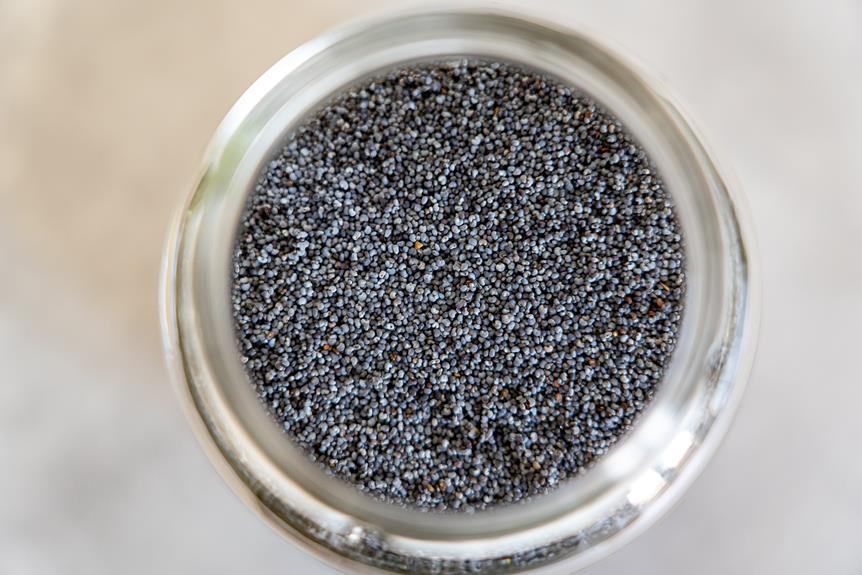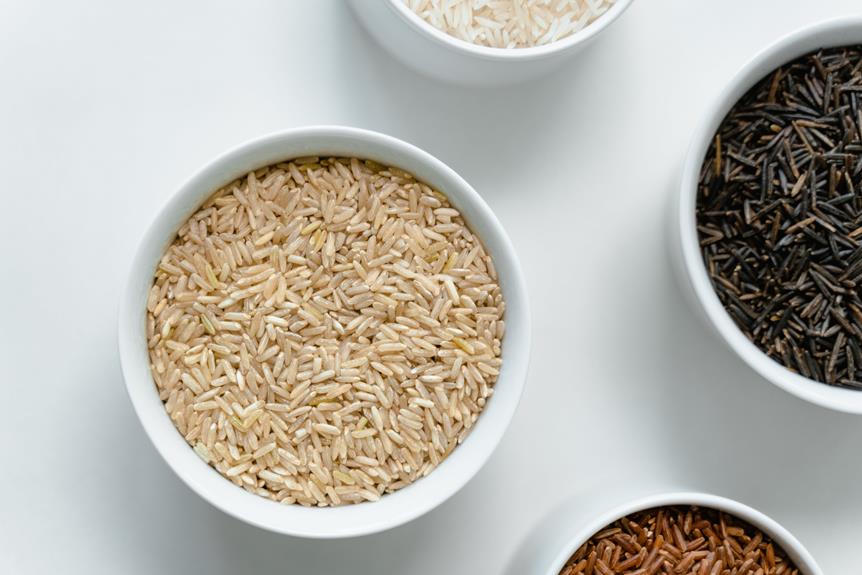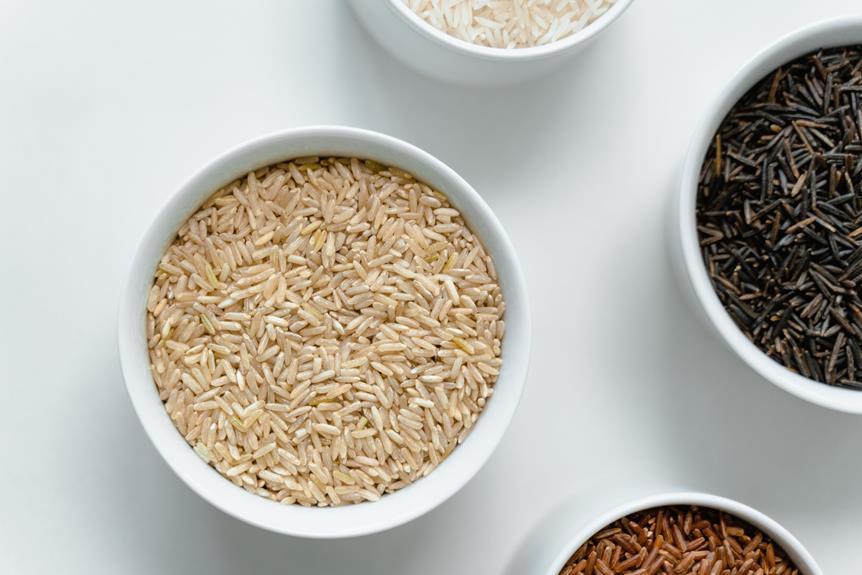Are you tired of dealing with digestive issues? You're not alone. Many people struggle with gut health, but there is a solution. Dietary fiber has been shown to have numerous advantages when it comes to promoting a healthy gut. But what exactly are these advantages? And how does one type of fiber compare to another? Well, buckle up because we're about to dive into the world of dietary fiber and uncover its secrets for improving gut health. So, let's get started!
Key Takeaways
- Dietary fiber promotes digestive health by adding bulk to stool, preventing constipation and regulating bowel movements.
- Fiber supports a healthy gut microbiome by acting as a prebiotic, producing beneficial short-chain fatty acids, and maintaining a protective gut barrier.
- Consuming fiber reduces the risk of digestive disorders such as hemorrhoids, diverticulosis, and colorectal cancer.
- Fiber enhances nutrient absorption, regulates blood sugar levels, and aids in weight management by increasing satiety and controlling appetite.
Promotes Regular Bowel Movements
Eating a diet rich in dietary fiber helps keep your bowel movements regular. Fiber is the indigestible part of plant foods that adds bulk to your stool and aids in its movement through the digestive system. When you consume enough fiber, it absorbs water and forms a soft, bulky mass that is easier to pass. This promotes regular bowel movements and prevents constipation.
Without enough fiber in your diet, your stool can become hard and dry, making it difficult to pass. This can lead to constipation, which is not only uncomfortable but can also increase the risk of developing hemorrhoids. By including fiber-rich foods in your meals, such as fruits, vegetables, whole grains, and legumes, you can help prevent constipation and maintain regularity in your bowel movements.
In addition to preventing constipation, a diet high in fiber can also help regulate bowel movements in individuals with diarrhea. The soluble fiber found in foods like oats, barley, and apples absorbs excess water in the intestines, adding bulk to the stool and reducing the frequency and severity of diarrhea.
To ensure you are getting enough fiber in your diet, aim for a daily intake of 25-30 grams. Start by gradually increasing your fiber intake and drinking plenty of water to prevent any digestive discomfort. It's important to note that fiber works best when consumed alongside an overall healthy diet and lifestyle. So, make sure to incorporate a variety of fiber-rich foods into your meals to support regular bowel movements and maintain good gut health.
Supports a Healthy Gut Microbiome
Including dietary fiber in your diet not only promotes regular bowel movements but also supports a healthy gut microbiome. The gut microbiome refers to the trillions of microorganisms that reside in your digestive tract, playing a crucial role in your overall health. A diverse and balanced gut microbiome is associated with various health benefits, such as improved digestion, enhanced immune function, and even mental well-being.
Dietary fiber acts as a prebiotic, providing nourishment to the beneficial bacteria in your gut. These bacteria thrive on fiber, fermenting it into short-chain fatty acids (SCFAs) that have numerous health benefits. SCFAs provide energy for the cells lining the colon, promote the absorption of minerals, and help regulate the pH level in the gut, creating a favorable environment for the growth of beneficial bacteria.
Furthermore, fiber helps increase the production of mucus in the gut, which acts as a protective barrier against harmful bacteria. It also helps to regulate the transit time of food through the digestive system, preventing the overgrowth of potentially harmful bacteria.
By supporting a healthy gut microbiome, dietary fiber can help prevent the colonization of pathogenic bacteria and reduce the risk of infections and inflammation in the gut. Additionally, a healthy gut microbiome has been linked to a reduced risk of various diseases, including obesity, type 2 diabetes, and certain types of cancer.
To support a healthy gut microbiome, it is recommended to consume a variety of dietary fiber sources, including fruits, vegetables, whole grains, legumes, and nuts. Aim to gradually increase your fiber intake and stay hydrated to optimize its benefits for your gut health.
Reduces the Risk of Digestive Disorders
Consuming an adequate amount of dietary fiber can significantly decrease the risk of developing digestive disorders. Including fiber-rich foods in your diet helps maintain a healthy digestive system and prevents various gastrointestinal conditions.
One of the main benefits of dietary fiber is its ability to prevent constipation. Fiber adds bulk to your stool, making it easier to pass through the digestive tract. This helps regulate bowel movements and prevents the buildup of waste materials in your colon, reducing the risk of conditions like hemorrhoids and diverticulosis.
Furthermore, a high-fiber diet can lower the risk of developing hemorrhoids. Hemorrhoids are swollen blood vessels in the rectal area, which can cause pain, itching, and bleeding. By promoting regular bowel movements and preventing straining, fiber helps alleviate the pressure on blood vessels, reducing the likelihood of hemorrhoids.
Dietary fiber also plays a crucial role in reducing the risk of developing colorectal cancer. It helps maintain a healthy gut environment by promoting the growth of beneficial bacteria and preventing the overgrowth of harmful bacteria. This balance in the gut microbiome is essential for optimal digestive health and reducing the risk of various gastrointestinal disorders, including colorectal cancer.
Moreover, fiber-rich foods can help manage and prevent digestive disorders such as gastroesophageal reflux disease (GERD) and irritable bowel syndrome (IBS). Fiber absorbs excess stomach acid, reducing the likelihood of acid reflux and heartburn. It also adds bulk to the stool, easing symptoms of diarrhea and constipation associated with IBS.
Enhances Nutrient Absorption
To enhance nutrient absorption, incorporating an adequate amount of dietary fiber into your diet is essential. Dietary fiber plays a crucial role in improving the absorption of nutrients from the food you consume. Here are five ways in which dietary fiber enhances nutrient absorption:
- Increases surface area: Dietary fiber adds bulk to your stool, which increases the surface area for nutrient absorption in the intestines. This allows for better absorption of essential vitamins and minerals.
- Slows down digestion: Soluble fiber forms a gel-like substance when it comes into contact with water. This gel slows down the digestion process, giving your body more time to absorb nutrients from the food you eat.
- Binds to toxins: Fiber has the ability to bind to harmful substances, such as toxins and cholesterol, in your digestive tract. By doing so, it prevents these substances from being absorbed into your body, allowing for better nutrient absorption instead.
- Promotes gut health: Dietary fiber acts as a prebiotic, providing nourishment for the beneficial bacteria in your gut. These bacteria help break down food particles and produce short-chain fatty acids, which enhance nutrient absorption.
- Regulates blood sugar levels: High-fiber foods, such as whole grains and legumes, help regulate blood sugar levels by slowing down the absorption of glucose. This prevents spikes in blood sugar levels and ensures a steady supply of nutrients to your body.
Aids in Weight Management
Incorporating an adequate amount of dietary fiber into your diet aids in weight management. Fiber-rich foods help you feel fuller for longer, reducing the likelihood of overeating and snacking on unhealthy options. When you consume foods high in fiber, such as fruits, vegetables, and whole grains, they take longer to digest, slowing down the rate at which your stomach empties. This delay in digestion keeps you feeling satisfied and helps control your appetite throughout the day.
Furthermore, dietary fiber adds bulk to your meals without adding excess calories. Since fiber is not fully digested by the body, it passes through the digestive system relatively intact. This means that foods high in fiber provide fewer calories compared to foods low in fiber. By choosing fiber-rich options, you can enjoy larger portions without consuming excessive calories, making it easier for you to maintain a healthy weight.
In addition, fiber helps regulate blood sugar levels by slowing down the absorption of sugar into the bloodstream. This is particularly beneficial for weight management because it prevents spikes in blood sugar levels, which can lead to increased hunger and cravings for sugary foods. By stabilizing blood sugar levels, dietary fiber helps you maintain better control over your food choices and reduces the likelihood of overindulging in unhealthy snacks.
Moreover, certain types of dietary fiber, such as soluble fiber, have been shown to specifically target belly fat. This type of fiber forms a gel-like substance in the digestive tract, which can help reduce the absorption of dietary fat and cholesterol. By targeting belly fat, dietary fiber can contribute to a healthier body composition and aid in weight loss efforts.
To reap the benefits of dietary fiber for weight management, aim to include a variety of fiber-rich foods in your diet. Fruits, vegetables, whole grains, legumes, and nuts are all excellent sources of fiber that can support your weight management goals. Remember to gradually increase your fiber intake and drink plenty of water to help prevent bloating and constipation. By making fiber a regular part of your diet, you can enhance your weight management efforts and promote overall health and well-being.
Frequently Asked Questions
How Much Dietary Fiber Should I Consume Daily to Support a Healthy Gut Microbiome?
To support a healthy gut microbiome, you should consume an adequate amount of dietary fiber daily. While the specific amount may vary depending on individual needs and dietary restrictions, experts generally recommend aiming for around 25-30 grams per day. This can be achieved by incorporating a variety of fiber-rich foods into your diet, such as fruits, vegetables, whole grains, legumes, and nuts. Remember to gradually increase your fiber intake and stay hydrated to help your gut function optimally.
Can Dietary Fiber Help Alleviate Symptoms of Irritable Bowel Syndrome (Ibs)?
Dietary fiber can indeed help alleviate symptoms of irritable bowel syndrome (IBS). By adding more fiber to your diet, you can improve your gut health and reduce symptoms like bloating, constipation, and diarrhea. Fiber acts as a bulking agent, making your stool softer and easier to pass. It also helps regulate bowel movements, promoting a healthy digestive system. Including fiber-rich foods like fruits, vegetables, whole grains, and legumes in your diet can provide relief for IBS symptoms.
Are There Any Specific Types of Dietary Fiber That Are More Effective in Reducing the Risk of Digestive Disorders?
There are indeed specific types of dietary fiber that can be more effective in reducing the risk of digestive disorders. These types include soluble fiber, which dissolves in water and forms a gel-like substance in the digestive tract. This helps to soften stool and prevent constipation. Insoluble fiber, on the other hand, adds bulk to the stool and promotes regular bowel movements. Both types of fiber are important for maintaining a healthy gut and reducing the risk of digestive disorders.
Can Increasing Dietary Fiber Intake Lead to Bloating or Gas?
Increasing your dietary fiber intake can sometimes lead to bloating or gas. This is because certain types of fiber, such as soluble fiber, can ferment in the gut, producing gas as a byproduct. However, this is not the case for everyone, and the benefits of consuming adequate dietary fiber far outweigh the potential discomfort. It is important to gradually increase your fiber intake and drink plenty of water to help alleviate any bloating or gas symptoms.
Is There a Recommended Time of Day to Consume Dietary Fiber for Optimal Gut Health Benefits?
Is there a recommended time of day to consume dietary fiber for optimal gut health benefits? The recommended time to consume dietary fiber for optimal gut health benefits varies among individuals. Some people find it helpful to consume fiber-rich foods in the morning to kickstart digestion and promote regular bowel movements throughout the day. Others prefer to spread their fiber intake throughout the day by including fiber-rich snacks and meals. Ultimately, listen to your body and find a routine that works best for you.




